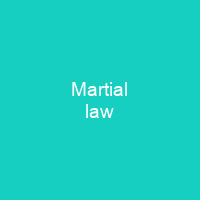Martial Law: A Closer Look
Imagine a world where the usual rules don’t apply, and military authority takes over civilian life. That’s what martial law is all about—when a government suspends civil rights and laws in favor of military rule during emergencies or conflicts.
The Essence of Martial Law
So, why would anyone need to declare martial law? It’s often invoked when there’s an urgent situation that requires swift action. Think of it as a temporary emergency brake on the usual democratic processes. But is this always for the better?
Martial Law in Practice
Let’s take a look at some countries where martial law has been declared. In Canada, during World War I and II, and the October Crisis of 1970, emergency powers were used under the War Measures Act. Quebec saw martial law twice during the American Revolutionary War and in 1837-1838.
In China, martial law dates back to the Qing dynasty and has been used in various forms, including during the February 28 incident of 1947 and the Tiananmen Square protests. Similarly, Egypt saw almost continuous states of emergency from 1967 to 2021, with military courts having significant powers over civilians.
Martial Law Around the Globe
From Finland’s Preparedness Act to Israel’s strict martial law during the 1967 war and beyond, countries have used this extraordinary measure in different ways. In Pakistan, martial law has been imposed multiple times, each time with varying degrees of impact on civilian life.
In Philippines, President Ferdinand Marcos declared a second martial law from 1972 to 1981, initially to suppress civil strife but later becoming controversial. The longest period of martial law was in Syria, lasting an astounding 48 years before it was finally lifted.
Modern Implications and Controversies
Martial law is a double-edged sword. While it can provide the necessary order during emergencies, it often comes at the cost of civil liberties. The United States, for instance, has declared martial law in various historical events but lacks an explicit constitutional provision for its declaration.
In recent years, countries like Ukraine have seen multiple extensions to their declarations of martial law due to ongoing conflicts and emergencies. This raises questions about the balance between security and freedom.
Conclusion
Martial law is a complex issue that touches on fundamental rights and national security. As we navigate through these challenging times, it’s crucial to understand its implications and ensure that such measures are used responsibly and transparently.
You want to know more about Martial law?
This page is based on the article Martial law published in Wikipedia (retrieved on December 25, 2024) and was automatically summarized using artificial intelligence.






